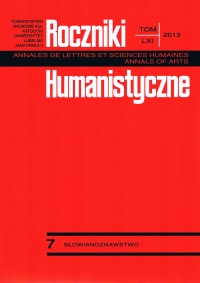Współczesne znaczenie pracy Ryszarda Łużnego o wychowankach Akademii Kijowsko-Mohylańskiej
Abstrakt
This paper attempts to investigate the current relevance and significance of the work published by Prof. Ryszard Łużny in 1966, entitled Writers in the Kiyv-Mohyla Academy circle and their influence on Polish literature.
This seminal work became an epistemological and axiological foundation for the author's own research, but also for his numerous students and followers, engaged in the investigations of the Polish East Slavic relations in the domains of culture and religion. Łużny's work is an example of an objective and ideologically unbiased, humanistic approach of a philologist and researcher of cultures to facts and to the ontological, axiological and historical truth they correspond with. Rejecting the theory of the paramount role of Polish culture in shaping the creative personalities of the writers – students of Kiyv-Mohyla Academy – R. Łużny proved that they were a first point of contact between the EastSlavic culture, mostly Russian, Poland and the West.
Современное значение книги Рышарда Лужного о воспитанниках КиевоМогилянской Академии
В настоящей статье предпринята попытка представить современное значение опубликованной в 1966 г. книги Рышарда Лужного Писатели круга КиевоМогилянской акаадемии и польская литература. Эта книга стала гносеологическим и аксиологическим фундаментом не только для ее автора, но и для многих его польских учеников и наследников в изучении польсковосточнославянских связей в области культуры и религии. Она является примером объективного, лишенного идеологических влияний подхода гуманиста – филолога и культуроведа – к фактам и связанной с ними онтологической, аксиологической и исторической правде. Отказавшись от каких бы то ни было преувеличений роли польской культуры в формировании творческой личности писателейвоспитанников КиевоМогилянской академии, Р. Лужны доказывает, что они стали первым звеном связывающим восточнославянскую, прежде всего русскую, культуру с Польшей и с Западом.
Copyright (c) 2013 Roczniki Humanistyczne

Utwór dostępny jest na licencji Creative Commons Uznanie autorstwa – Użycie niekomercyjne – Bez utworów zależnych 4.0 Międzynarodowe.





